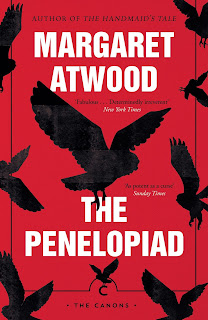The Penelopiad by Margaret Atwood
Little Miss Ugly Duck
The Penelopiad by Margaret Atwood is a retelling of Homer's Odyssey from the point of view of Penelope, Odysseus's wife. She tells the story of her marriage from the afterlife, and regrets the violent deaths of her twelve maids.
Story ☆☆★★★
When I was about eight years old, my Dad decided it would be a good idea to read me The Odyssey as a bedtime story. From this ambitious plan, I only remember Penelope and her clever idea of refusing to marry one of her many suitors until she had finished weaving a shroud for her father-in-law. Every night she unpicks her work, so the shroud will never be finished, and she won't have to marry any of the rowdy, rude men that squat in her house.
This is the crux of Atwood's story, although she charts the majority of Penelope's life, from her father throwing her into the sea as an infant, to her wanderings through the afterlife, encountering various figures she knew. A lot of attention is paid to the wedding and early marriage -- particularly Penelope's rivalry with her cousin, Helen (of Troy). Atwood goes a long way to humanise Penelope and the other women of the story. Penelope has a wry humour to her narrative and treatment of the other characters.
Penelope's story is broken up by interludes of poetry, song, interview and judicial transcripts given by Penelope's twelve maids. These are the maids that were punished for allegedly aiding and abetting the suitors, as well as sleeping with them. Penelope tells an alternative story, wherein the deaths of her maids is her fault and a terrible mistake. The twelve maids amass into a single entity in the after life, who run away from Penelope whenever she tries to approach them.
Style ☆★★★★
For what might have been a dry adaptation, Atwood lends her dry sense of humour and practicality to Penelope's narrative. The tone is light, even when referencing rape or piles of dead bodies. It could come across as flippant, but is delivered with an acknowledgement that this was a different time. Despite the classical setting, Penelope is a relatable character, her difficulties with her extended family ones that the reader will recognise.
The various interludes from the twelve maids are interesting. There's a wide variety to the ways they try to express themselves that have already been enumerated. Some of these interludes offer a different view to Penelope's story, some discuss the use of their deaths as symbolism or a story-telling technique. Although the maids are generally expressed as a block, they are humanised and given character. They are women who didn't deserve to die, and certainly not as a footnote to a story, a scapegoat for Penelope's own alleged bad behaviour. If I was Penelope, I'd feel guilty, too!
Substance ☆☆★★★
As an adaptation, The Penelopiad does well. It doesn't suffer from sticking too closely or deviating too far from the original, and has something fresh to say about The Odyssey. It highlights how important it is to remember the women in stories, but also to think about their roles. It humanises the epic, and takes it down a peg or two from it's high-fallutin' position in the literary canon.
This is a short novel -- in fact, I read it in one day. This works for what the story is trying to do, though. Characters are drawn quickly and accurately -- vain Helen of Troy is particularly vivid, and reminiscent of such vile women in literature as Blanche Ingram (Jane Eyre) or Belle Gardiner (Little Women).
Verdict ☆☆★★★
While little is changed from the essential story of The Odyssey, The Penelopiad packs a little punch. It focuses on the lives of the women, their gripes and trials. It makes characters of mythology into real people, who worry that they're not pretty enough and share midnight feasts. The more fantastical elements of the epic are treated with a wry humour and levity that lightens what could be gory and disturbing story elements. A perfect little package.


Comments
Post a Comment